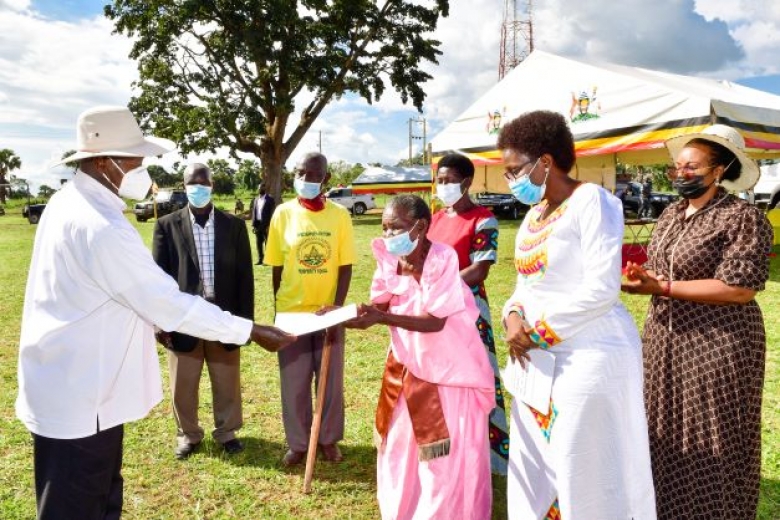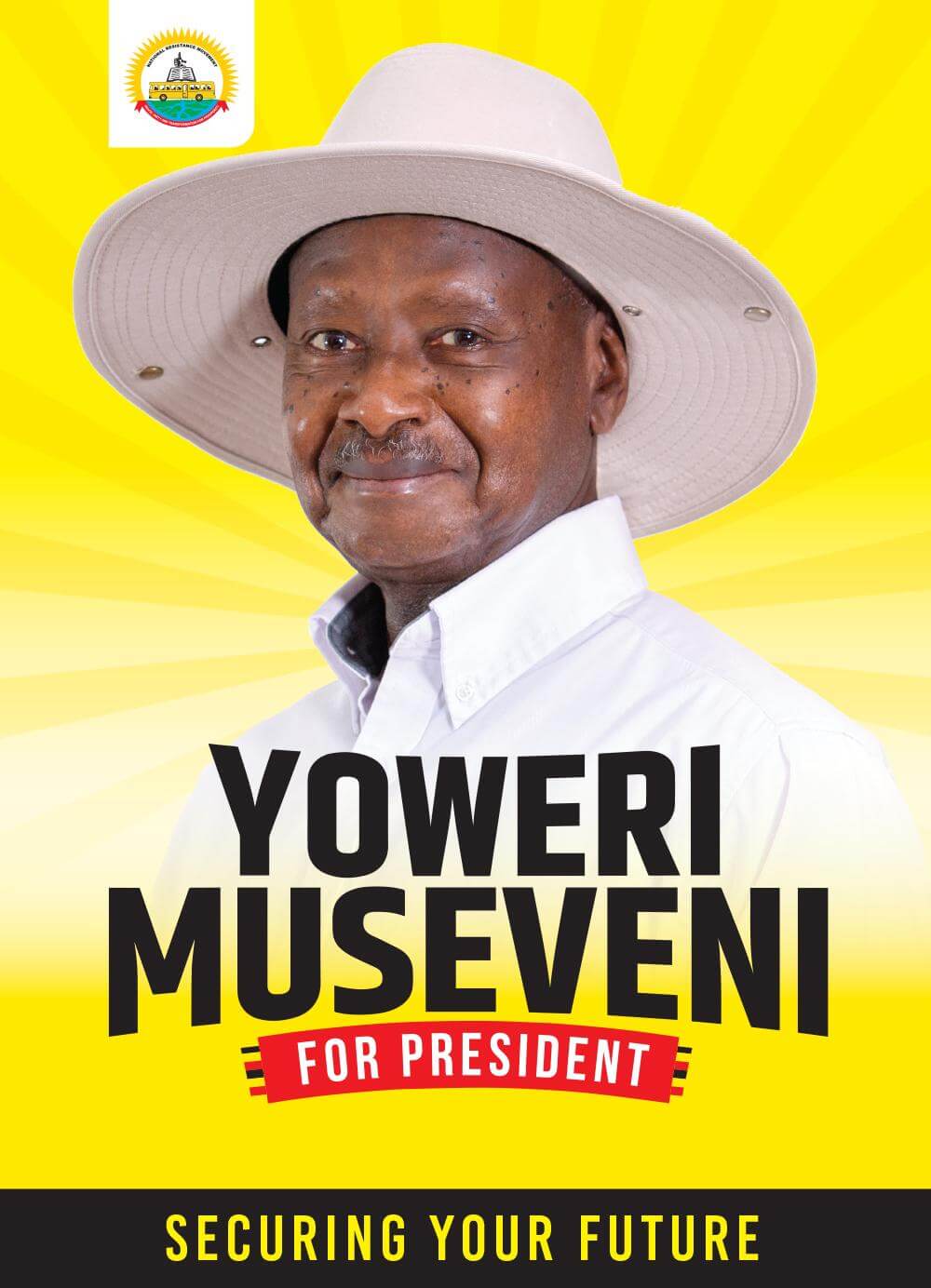
President Yoweri Kaguta Museveni has re-echoed the danger associated with land fragmentation saying it’s part of the hindrances to prosperity of the Ugandan people.
According to H.E the President, the culture of subdividing land among children especially when the owner dies cannot support commercial agriculture which is the backbone of Uganda’s economy as children will resort to selling off the land instead of collective investment.
The President was speaking shortly after handing over certificates of customary land ownership to 1,537 families and communities in Northern Uganda, West Nile and Karamoja at a ceremony that took place at Ibuje Primary School in Apac District
“Now that you have got these titles, I want to point out to you one danger for Uganda as a whole. When the owner dies, there is the culture of subdividing the land; physical fragmentation of land is very dangerous for the development of the country. Because if the land is too small and you subdivide it among the children, in future they will have nowhere to cultivate,” citing areas of West Nile where the average land ownership in Maracha district is two acres
“This is the problem of West Nile now. You have heard that the average land ownership in Maracha is two acres for both subsistence and commercial farming. They continued with tobacco growing of which the earnings from tobacco cannot go beyond 800,000 Uganda shillings per acre per annum. So how do you get out of poverty?” the President noted.
According to President Museveni, both in the colonial times and after independence, customary ownership was recognised and well known traditionally and it would be known by everybody who owns the land although some was owned communally especially in cattle grazing areas.
“I congratulate the Ministry of Lands for getting out of sleep (niino in langi) and solving this problem. Because I am sure you know who owns what everywhere. So, why not capture it in a document? And that’s what we have done here,” adding that “the Government will do the survey for all the poor people in Uganda.
He thanked the European Union (EU) for supporting the initiative that will be rolled out to the whole country.
The activity is being implemented by the Government of Uganda with financial support from the EU and United Nations Capital Development Fund. Other implementing partners include Cadasta Foundation and CEDP of the World Bank.
H.E the President said it will be easy for people with big land to do intensive and extensive agriculture which wouldn’t be possible if the land is fragmented into four acres and less.
“Here, I am really appealing to Ugandans when we’re making wills to our children; this system of dividing land is a problem in future,” He encouraged families to instead keep the land together and give shares to their children.
“When they earn money, they share the profits accordingly,” he said.
According to the Minister of Lands, Housing and Urban Development, Hon. Judith Nabakooba, the certificates being issued are mandated by law, and recognized by Government institutions, Financial institutions and the Courts of Law and the mapping of parcels has used both traditional and scientific methods of demarcation.
“Even if the traditional boundary markers are uprooted or shifted, it is easy to retrace one's boundaries because the boundary coordinates have also been provided for each title, using SMART technologies,” noted Hon. Nabakooba
The National Resistance Movement (NRM) Government under the current Manifesto (2021-2026) pledged to process and give land owners legal documentation in terms of land titles and this is the basis for processing 4,006 customary titles for families in Greater Northern Uganda.
More customary titles are to be processed by the Government, targeting the registration of 275,000 families, 630 clans and indigenous and vulnerable communities within the next two years.
“Our target shall be to reach out to land owners in 35 districts in the country.
This is the best way to secure customary ownership rights and thereby prevent public outcry, including stopping the abuse, stealing or grabbing of customary land by unscrupulous individuals, speculators and land dealers,” the Minister said.
Minister Nabakooba further informed the President that the act of registering customary land has moved many of the beneficiaries from the subsistence economy to the market economy where they can now use their customary land titles to help them create wealth and break out of poverty. “Because of this achievement, ‘Kuchi’ (peace) has returned. I am informed that families and communities have began to engage in producing surplus food for sale, including growing palm trees, soya bean, cotton and sunflower, knowing that no one will destroy their cash crops through acts of illegal land evictions and destruction of their investments on land,” she said.
A total of 6,393 beneficiaries from Apac district, of which 2,450 (38%) are female, received their titles.
The average acreage or land holding for families in Apac district is 4.8 acres. In Maracha it is 2 acres while in Agago it is 8 acres.
Mr Asanti Odongo, the District Chairperson Apac district, described the exercise as the final nail in the coffin to the rampant land conflicts resulting in death and constant court cases that affect development as much of the land has not been put into good use.
"Your Excellency, Sir, research has shown that most of our magistrate courts within the region are occupied by land related cases. This, therefore, has made our communities poor and non productive," Chairman Odongo said. He, however, cautioned land committees to desist from issuing certificates for land in swamps.
Ms. Caroline Adriansen, the EU Head of Cooperation and Development reiterated commitment of EU to provide resources amounting to £8 million to scale up this initiative to benefit Ugandans.
"The European Union will continue to support the Government of Uganda in scaling up this project to most of the Northern and Eastern region where customary land tenure is dominant to further support customary land governance," Ms. Adriansen said.
At the same function, President Museveni congratulated the people of Lango for taking oalm oil growing seriously, joining those of Kalangala, Rakai, Bundibugyo and Mayuge, saying they are going to help Uganda solve the problem of lack of soap.
The President also touched on irrigation, saying the Government has a plan to introduce irrigation in the whole country and protect all the swamps as water catchment areas.
“We are going to encourage everyone in Uganda to preserve the wetlands and take water from the wetlands to the land. That’s what we are going to do in the whole of Uganda. We must end this business of hunger by providing water for irrigation so that we can grow crops all year round and reliably. We are going to intensify that,” H.E the President said.
He also promised to handle the issue of poor roads in the region.
Apac now joins Kasese, Nwoya, Pader, Adjumani, Soroti, Katakwi, Butaleja, Kabale, Kisoro, Mbale, Dokolo and Amolatar districts in helping landowners to benefit from land registration using modern and scientific methods of securing their customary land rights and being able to prove their land ownership.
The 1995 Constitution under Article 237(1) & (3) provides that land in Uganda belongs to the citizens of Uganda and shall be held under four tenure systems which include; Customary, Freehold, Mailo and Leasehold.
The Constitution further provides under Article 237(4)(a) that all Ugandan citizens owning land under customary tenure may acquire a certificate of ownership in a manner prescribed by Parliament. This manner was prescribed by Parliament in 1998 under the Land Act and the procedures for implementation were laid down in the 2004 Land Regulations.


